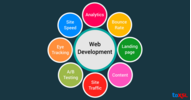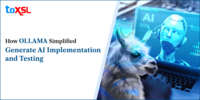- Oct 10, 2025
Share this post on:
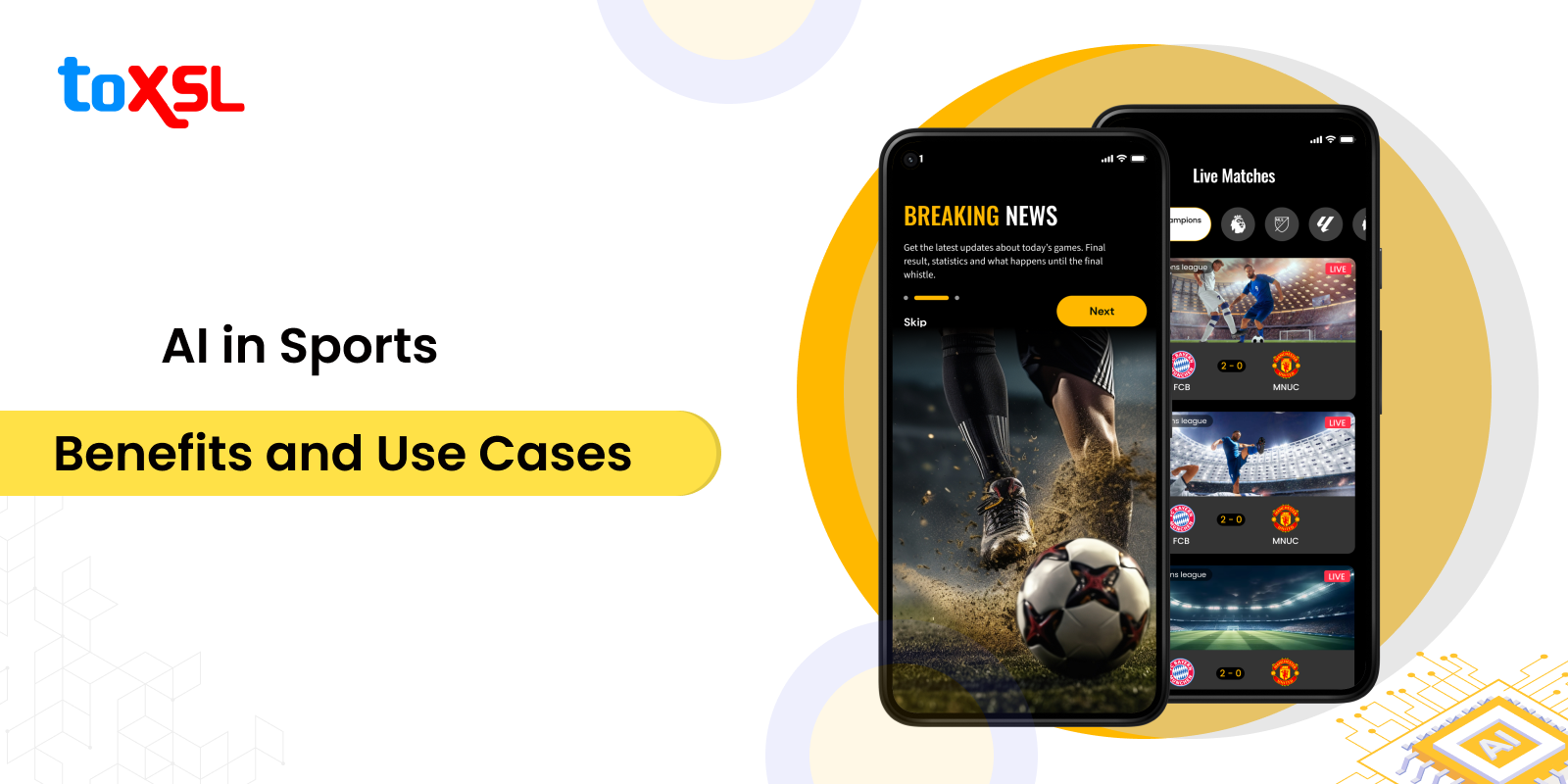
Today, AI is creating the same level of excitement as we experienced during the early days of the internet. Intuitively, businesses have sensed that AI is going to change the IT industry completely, but the question is, How? Is AI going to impact the sports landscape?
As we move forward into AI, we are going to witness massive changes in the sports industry. The market of Artificial Intelligence is growing and is estimated to reach almost $16.5 billion by 2031.
The sports industry has always been at the forefront of adopting new technologies to gain a competitive edge. In recent years, artificial intelligence (AI) has emerged as a game-changing force, transforming various aspects of sports from athletic performance to fan engagement and business operations. This blog explores the wide-ranging applications of AI in the sports industry, highlighting how this technology is reshaping the landscape for businesses.
Revolutionizing Sports: The Benefits of AI
Artificial Intelligence (AI) has brought about a significant transformation in the sports industry, offering numerous benefits. Let’s delve into some of the key advantages of AI in sports:
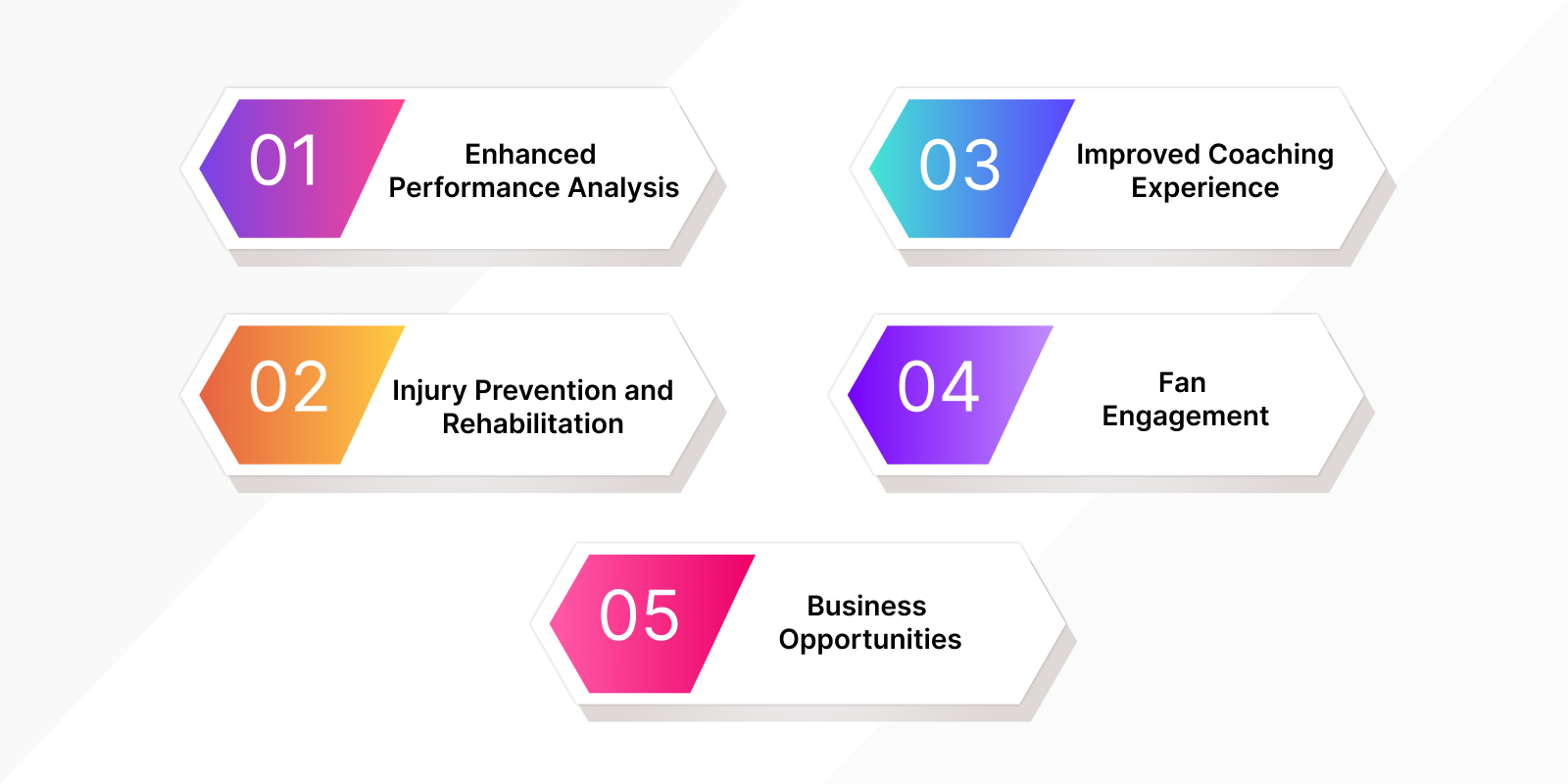
1. Enhanced Performance Analysis: AI-driven data analytics tools provide valuable insights into athletes’ performance, helping coaches and trainers make informed decisions about training strategies. By analyzing vast amounts of data quickly and efficiently, AI enables personalized training programs tailored to individual needs, leading to improved performance on the field.
2. Injury Prevention and Rehabilitation: AI technology plays a crucial role in identifying potential injury risks by monitoring factors like force production, muscle activation, and joint angles. By pinpointing problematic movements early on, AI systems can recommend corrective measures to prevent injuries. Additionally, AI assists in designing personalized rehabilitation programs for injured athletes, monitoring their progress in real time, and providing feedback for a speedy recovery.
3. Improved Coaching Experience: AI-powered coaching tools offer athletes personalized workout programs based on their goals, skill levels, and progress. These systems ensure that training sessions are optimized for maximum effectiveness, enhancing the overall coaching experience for both professional athletes and fitness enthusiasts.
4. Fan Engagement: AI has revolutionized how fans engage with sports content by providing immersive experiences through technologies like virtual reality (VR) and augmented reality (AR). AI-driven sports broadcasting enhances viewer experiences by generating highlight reels and offering unique perspectives during live games, keeping fans informed and entertained.
5. Business Opportunities: The integration of AI in sports opens up new business opportunities for startups, tech firms, and investors. With the growing demand for AI-powered solutions in the sports industry, there is immense potential for innovation and growth in areas such as sports analytics, fan engagement platforms, and performance-tracking devices.
Application of AI in Sports: Revolutionizing Performance and Engagement
The sports industry has undergone a significant transformation, driven largely by advancements in technology. Among these innovations, Artificial Intelligence (AI) stands out as a game-changer, offering unprecedented capabilities to enhance performance, optimize training regimens, and revolutionize fan engagement. From fitness app development to the integration of IoT devices and generative AI solutions, the applications of AI in sports are diverse and far-reaching, promising to reshape the landscape of both professional and amateur athletics.
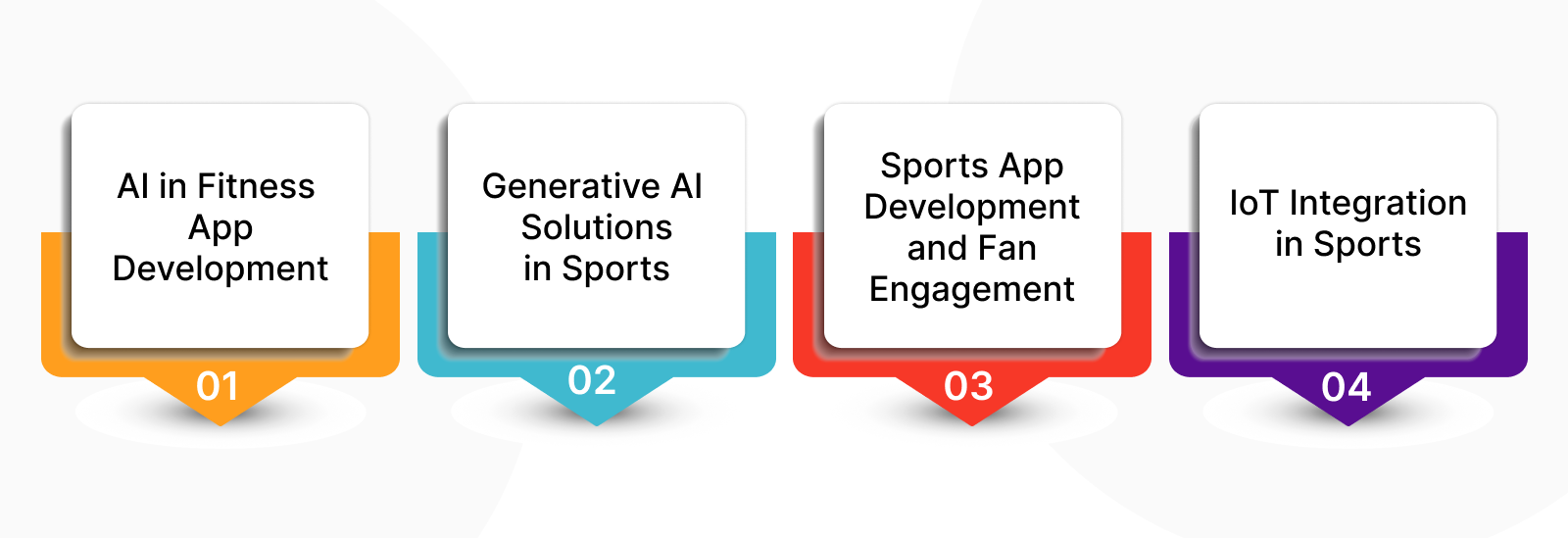
1. AI in Fitness App Development
One of the most prominent applications of AI in sports is in the development of fitness apps. These apps leverage AI algorithms to provide personalized training programs and real-time performance analytics to users. For instance, companies like Nike and Under Armour have integrated AI into their apps to offer customized workout routines based on user data such as fitness levels, goals, and biometrics.
AI-powered fitness apps utilize machine learning models to analyze user behavior and preferences, adapting workout plans dynamically to maximize effectiveness and motivation. These apps can also incorporate predictive analytics to foresee potential injuries or performance plateaus, thereby allowing athletes to adjust their training routines preemptively.
2. Generative AI Solutions in Sports
Generative AI has found innovative applications in sports, particularly in designing equipment and optimizing strategies. For example, companies are using generative design algorithms to create highly efficient sports gear, such as lightweight and durable shoes or aerodynamic clothing for athletes.
In addition, generative AI is employed in tactical analysis and game strategy formulation. Coaches and analysts can use AI-powered software to simulate different game scenarios, predict opponent strategies, and optimize team formations based on real-time data from matches. This not only enhances strategic planning but also provides valuable insights into player performance and opponent tendencies. For teams and organizations looking to implement these insights effectively, strategic planning facilitation ensures that AI-driven strategies are integrated smoothly into training and decision-making processes.
3. Sports App Development and Fan Engagement
AI has transformed how fans interact with sports through enhanced sports app development. Major sports leagues and teams utilize AI to offer immersive fan experiences, from personalized content recommendations to real-time updates and interactive features during matches. For instance, AI-powered chatbots integrated into sports apps can provide instant responses to fan queries, deliver customized news updates, and even simulate conversations with famous athletes. This level of engagement not only enhances fan satisfaction but also boosts fan loyalty and revenue generation opportunities through targeted advertising and merchandise sales.
4. IoT Integration in Sports
The Internet of Things (IoT) has revolutionized sports through the integration of connected devices and sensors. IoT devices embedded in sports equipment, clothing, and stadiums collect real-time data on athletes' biometrics, performance metrics, and environmental conditions.
AI algorithms analyze this IoT-generated data to provide actionable insights that drive performance enhancement and injury prevention strategies. For example, wearable IoT devices can monitor an athlete's heart rate, muscle fatigue levels, and hydration status during training or competition, enabling coaches to make data-driven decisions in real time.
Challenges of AI in Sports
Artificial Intelligence (AI) has transformed numerous industries, from healthcare to finance, and sports is no exception. Looking ahead, the future of AI in sports appears promising yet challenging. However, with these opportunities come significant challenges that must be navigated carefully. Let’s explore some of the key challenges AI faces in the world of sports.
Data Quality and Availability
AI systems thrive on data, but acquiring high-quality, relevant data in sports can be a complex task. While certain metrics like scores and game statistics are readily available, obtaining comprehensive and consistent data for more nuanced aspects such as player movement patterns, biomechanical data, or psychological factors remains a challenge. Variations in data collection methods across different sports and leagues further complicate the process.
Bias in Data and Algorithms
Bias in AI systems can arise from biased training data or algorithmic biases themselves. In sports, this could manifest as biases in player evaluations, referee decisions, or fan engagement strategies. For example, historical biases in player recruitment or referee decisions could inadvertently be perpetuated by AI systems if not carefully mitigated and monitored.
Interpretability and Transparency
AI models often operate as 'black boxes,' making it challenging to understand how they arrive at their conclusions. In sports, where decisions based on AI insights can have significant implications (such as player selection or coaching strategies), the lack of interpretability and transparency can undermine trust among coaches, athletes, and stakeholders.
Integration with Human Expertise
While AI can provide valuable insights and analysis, it should complement rather than replace human expertise in sports. Coaches, athletes, and other stakeholders bring invaluable experience, intuition, and context that AI may struggle to replicate. Ensuring effective collaboration between AI systems and human experts is essential for maximizing the benefits of AI in sports.
Privacy and Data Security
Sports organizations collect a vast amount of personal data, from athletes’ performance metrics to fan engagement behaviors. Protecting this data from breaches and ensuring it is used ethically and with consent are critical challenges. Striking the right balance between data-driven insights and respecting individual privacy rights is crucial for the sustainable implementation of AI in sports.
ToXSL Technologies: Your Guide to Simplified Sports App Development
The applications of AI in sports app development systems are vast and continually expanding. From enhancing athlete performance and fan engagement to revolutionizing content creation and sports betting, AI is transforming every aspect of the sports industry. As an artificial intelligence services company or app development company specializing in sports, the opportunities to innovate and create value are immense. The integration of AI with other technologies like IoT in sports and generative AI solutions is opening up new frontiers in sports technology, creating more immersive, personalized, and data-driven experiences for all stakeholders in the sports ecosystem.
However, with these advancements come challenges and responsibilities. Developers and sports organizations must navigate issues of data privacy, ethical use of AI, and maintaining the human element that makes sports so compelling. As AI systems become more sophisticated, there's also a need to ensure transparency and fairness, particularly in areas like performance analysis and sports betting.
Looking ahead, we can expect AI to play an even more significant role in sports app development. The future may bring more advanced predictive models, even more immersive AR and VR experiences, and AI systems that can understand and analyze sports at a level comparable to human experts.
So, if you are looking forward to developing a sports app by integrating AI into it, look no further than ToXSL Technologies. We are a team of expert developers, designers, and testers who create responsive app solutions that can help your business grow. Connect with us and set new benchmarks for innovation and excellence in athletics.
FAQs
Q1: How is AI used in the sports industry?
AI is used in sports for performance analysis, injury prediction, fan engagement, and game strategy optimization. It helps coaches and teams make data-driven decisions to improve outcomes both on and off the field.
Q2: What are the main benefits of using AI in sports?
AI enhances training efficiency, reduces injury risks, improves decision-making, and boosts fan experiences through personalized content and insights. It brings accuracy, speed, and smarter analytics to sports operations.
Q3: Can AI help in talent scouting and recruitment in sports?
Yes, AI tools analyze player statistics, performance trends, and potential to identify promising talent. It helps teams make informed recruitment decisions faster and more effectively than traditional methods.





